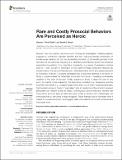Rare and Costly Prosocial Behaviors Are Perceived as Heroic
Author(s)
Kraft-Todd, Gordon T.; Rand, David Gertler
DownloadPublished version (621.1Kb)
Publisher with Creative Commons License
Publisher with Creative Commons License
Creative Commons Attribution
Terms of use
Metadata
Show full item recordAbstract
Heroism has only recently become a topic of empirical investigation. Existing research suggests a connection between heroism and four well-documented dimensions of human social behavior: (1) the cost incurred by the actor; (2) the benefit provided to the recipient; (3) the perceived frequency (i.e., descriptive normativity); and (4) the perceived expectation to perform it (i.e., injunctive normativity). In a series of exploratory studies (total N = 408), we aim to shed light on how each of these constructs influence lay intuitions about the nature of heroism (i.e., what determines which acts people perceive to be heroic). In Study 1, subjects generated a list of acts they deemed to be heroic. In Study 2, subjects rated the heroicness of the acts from Study 1, revealing considerable variation in the level of heroism. Finally, subjects in Study 3 rated the cost to the actor, the benefit to the recipient(s), the descriptive normativity (i.e., frequency), and the injunctive normativity (i.e., obligatoriness) of ten acts, five of which received particularly high heroism scores in Study 2 ("exemplary" acts of heroism) and five of which received particularly low heroism scores in Study 2 ("ambiguous" acts of heroism). We find that more heroic acts are seen as rarer and more costly to actors-but, interestingly, not more beneficial to recipients or less obligatory. These findings help to illuminate what it means to be seen as a hero, and suggest clear future directions for both empirical and theoretical work.
Date issued
2019-02Department
Massachusetts Institute of Technology. Department of Brain and Cognitive Sciences; Massachusetts Institute of Technology. Department of PsychologyJournal
Frontiers in Psychology
Publisher
Frontiers Media SA
Citation
Kraft-Todd, Gordon T. and David G. Rand. "Rare and Costly Prosocial Behaviors Are Perceived as Heroic." Frontiers in Psychology 10 (February 2019): 234 © 2019 Kraft-Todd and Rand
Version: Final published version
ISSN
1664-1078